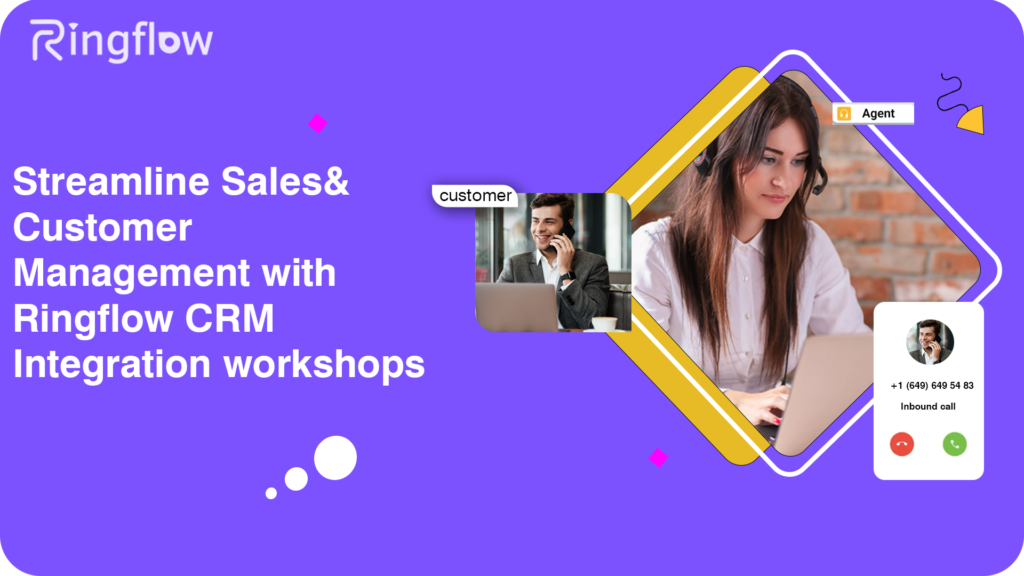Ringflow CRM Integration Workshops
Overview of Ringflow CRM and its benefits
Ringflow CRM is a powerful software allowing businesses to manage customer relationships effectively. It provides a comprehensive view of customer interactions, sales activities, and marketing campaigns.
With Ringflow CRM, businesses can easily track leads, forecast sales revenue, and generate detailed reports on key performance indicators.
Importance of integrating Ringflow CRM with other systems
In today’s digital landscape, businesses rely on multiple systems to manage their operations. For example, they use email marketing platforms for outreach campaigns and accounting software for financial management. Integrating Ringflow CRM workshops with these systems is critical because it enables data flow between platforms.
This means that when a lead becomes a customer or an invoice generator, all relevant information is automatically updated in Ringflow CRM workshops and any other integrated platforms. By integrating these different systems, businesses can create a more seamless process for managing leads, nurturing relationships with customers and driving revenue growth overall.
Understanding the Sales Process
Sales are an essential aspect of any business, and it is crucial to clearly understand how it functions. The sales process can be defined as a series of stages that a potential customer goes through before making a purchase.
These stages include awareness, interest, consideration, purchase decision, and post-sale evaluation. The sales process involves developing relationships with customers, identifying their needs and preferences, addressing their concerns and objections, and persuading them to make a purchase.
Overview of different systems that can be integrated with Ringflow CRM
Ringflow CRM is a powerful tool for managing sales and customers, but it can be even more effective when integrated with other systems. For example, email marketing software like Mailchimp or Constant Contact could be integrated with Ringflow to automatically update customer lists based on their sales activity.
Accounting software like Quickbooks or Xero could also be integrated to streamline invoicing and payment tracking. Other possible integrations include social media management tools, project management software, and e-commerce platforms.
Customizing Integration for Your Business
Customizing integration for your business is essential to ensure that all of your systems work together seamlessly. This ensures that all sales and customer management processes are streamlined, efficient and effective.
When customizing integration, it is essential to consider factors like the size of your business, the number of employees and customers you have, and the type of products or services you offer. You should also consider the existing systems you have in place and how they can be integrated with Ringflow CRM integration workshops.
Best Practices for Managing Integrated Systems
Tips for managing multiple integrated systems effectively
Here are some tips to help manage multiple integrated systems effectively:
1.Start with clear goals and objectives: Before integrating any system, it’s essential to have clear goals and objectives on what you want to achieve from the integration workshops.
2.Prioritize integration needs: Determine which integrations are most important for your business and prioritize them accordingly.
3.Assign roles and responsibilities: Assign roles and responsibilities to different team members to ensure that everyone knows their tasks in the integration process workshops.
4.Establish communication channels: Communication is key when integrating multiple systems.
5.Develop a maintenance plan: Developing a maintenance plan is critical in ensuring that integrated systems continue working optimally after the integration process.
Advanced Features and Tools in Ringflow CRM
Ringflow CRM is a powerful tool for businesses to manage their sales and customer relationships. However, many businesses may not know the advanced features and tools that can further enhance their operations. One such feature is reporting, which allows businesses to analyze data on sales performance, customer behavior patterns, and more. With this information, businesses can make informed decisions about where to allocate resources for maximum impact workshops. Another advanced feature is power automation, which streamlines repetitive tasks and frees up time for employees to focus on higher-level activities.
For example, with Ringflow CRM’s automation tools, businesses can automate email campaigns, lead generation processes, and even sales forecasting. This saves time and helps ensure consistency in messaging across all customer touchpoints.
Discussion on how these features can enhance sales and customer management
The benefits of using Ringflow CRM’s advanced features extend beyond just saving time or increasing efficiency. With detailed insights from reporting tools, businesses can better personalize their approach to customers by tailoring products or services based on specific needs or behaviors. Automation features help streamline communication between different departments in a company while ensuring consistent messaging across all channels.
Automated workshops also reduce errors caused by human intervention. By leveraging the advanced features within Ringflow CRM, such as reporting and automation tools, companies will gain a competitive advantage that will improve their overall performance across all sales and customer management aspects.




